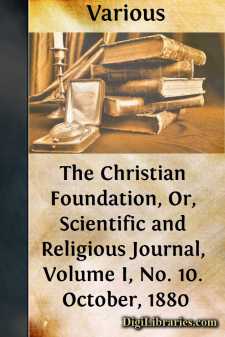Categories
- Antiques & Collectibles 13
- Architecture 36
- Art 48
- Bibles 22
- Biography & Autobiography 813
- Body, Mind & Spirit 138
- Business & Economics 28
- Children's Books 12
- Children's Fiction 9
- Computers 4
- Cooking 94
- Crafts & Hobbies 4
- Drama 346
- Education 46
- Family & Relationships 57
- Fiction 11821
- Games 19
- Gardening 17
- Health & Fitness 34
- History 1377
- House & Home 1
- Humor 147
- Juvenile Fiction 1873
- Juvenile Nonfiction 202
- Language Arts & Disciplines 88
- Law 16
- Literary Collections 686
- Literary Criticism 179
- Mathematics 13
- Medical 41
- Music 40
- Nature 179
- Non-Classifiable 1768
- Performing Arts 7
- Periodicals 1453
- Philosophy 64
- Photography 2
- Poetry 896
- Political Science 203
- Psychology 42
- Reference 154
- Religion 505
- Science 126
- Self-Help 81
- Social Science 81
- Sports & Recreation 34
- Study Aids 3
- Technology & Engineering 59
- Transportation 23
- Travel 463
- True Crime 29
The Christian Foundation, Or, Scientific and Religious Journal, Volume I, No. 10. October, 1880
by: Various
Categories:
Description:
Excerpt
LAW AND ATONEMENT.
"The soul that sinneth it shall die," and it "shall not die."
The first quotation, "The soul that sinneth it shall die," is often produced in support of the scholastic idea that the law of God was inexorable, that is absolute or unconditional, not to be moved or its penalty escaped by reformation or petition.
The language of the text is very definite, and, when viewed aside from its context as an inexorable law, it certainly follows that every sinning soul must pay its penalty. Neither can I see how it can be satisfied by punishing an innocent person in the room of the guilty, for the innocent one was not the "soul that sinned." Yet this quality of law is claimed in order to make out the theory of a vicarious punishment endured by the Savior, that is, that He took the sinner's "law place." This idea was necessitated by the theory that we all sinned when Adam transgressed, and lost all ability to do anything for ourselves. So we must be redeemed by satisfaction to justice, rather than by mercy. This old Calvinistic system of error lays the penalty of the inexorable law upon Christ. But Calvinists are not alone in this theory of a "vicarious punishment," in order to a vicarious atonement. Neither are they alone in the abuse of the phrase "the law," for our Sabbatarian friends are constantly asserting that the law of God was, and is, simply the ten commandments given, they say, to Adam in Eden, and authoritatively published on Sinai. They assert that all the balance of the five books of Moses was his law, written by him, but the record justifies us in saying, that the ten precepts were not the tenth part of the words given to Moses upon Sinai; neither were they all the words that were written upon the tables of stone. The tables begin with the sixth verse of the fifth chapter of the book of Deuteronomy, in these words, "I am the Lord thy God which brought thee out of the land of Egypt, from the house of bondage," and end with the twenty-first verse. But as the sixth verse is fatal to the Sabbatarian theory it is clipped off along with the fifteenth verse, which is cut out of the middle of the matter written upon the tables, and both are gravely divorced from God and handed over to Moses. Both, however, are in perfect harmony with the second and third verses, which read thus: "The Lord our God made a covenant with us in Horeb. The Lord made not this covenant with our fathers, but with us, even us, who are all of us here alive this day." That the sixth and fifteenth verses were upon the tables of stone is evident from the reading of the twenty-second verse, which reads thus: "These words the Lord spake unto all your assembly in the mount out of the midst of the fire, of the cloud, and of the thick darkness, with a great voice. And He wrote them in two tables of stone, and delivered them unto you."
Many persons who claim that the import of the term die, in the sentence "The soul that sinneth it shall die," was experienced by the Savior upon the cross dying as a substitute in the law-place of sinners, overlook several things of first importance. First, infants were not included in the provisions of a vicarious punishment and atonement unless it can be shown that they sinned—were sinners. Second, no innocent person can justly suffer in the law-place of the guilty. In all such cases justice is dishonored and law violated, for just law limits its penalties to the guilty.
Our salvation "is not of the law," but "by grace" or favor. Law had nothing to do with the death of Christ. He, "BY THE GRACE OF GOD, tasted death for every man." "If it be of the law it is not of grace." Again, the simple sentence, "The soul that sinneth it shall die," never was the law of God in any age, but simply a fraction of the law. Did Christ ever sin? No! Then He never honored this law, or satisfied its penalty by dying; for if, as our friends say, the inexorable quality of the law will forever hold the guilty to its claims, it will forever keep the innocent from its penalty. But I aver that the inexorable quality that is claimed for the law of God never belonged to it. No, not even to the simple sentence, "The soul that sinneth it shall die." The Lord authorizes us to supply the condition in every instance where it is not expressed, thus: "When I shall say unto the wicked, thou shalt surely die; if he turn from his sin and do that which is lawful and right; if the wicked restore the pledge, give again that he had robbed, walk in the statutes of life, without committing iniquity, he shall surely live, he shall not die." So the prophet gives us the second quotation at the head of this article, "Shall not die." It would be just as proper to make this last scrap of the law inexorable as its opposite....












